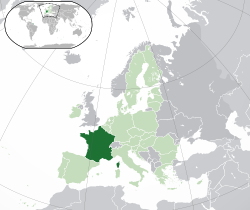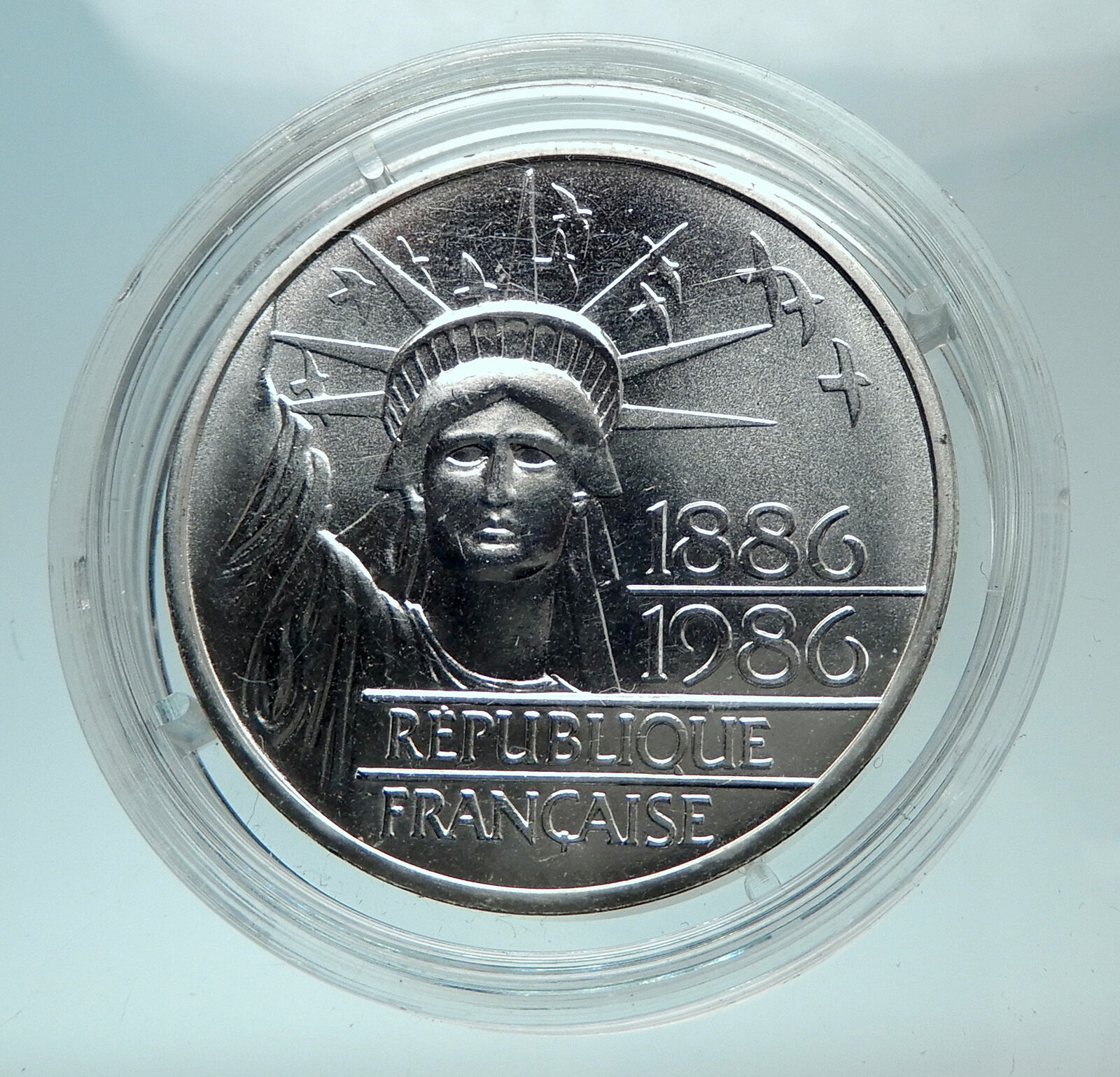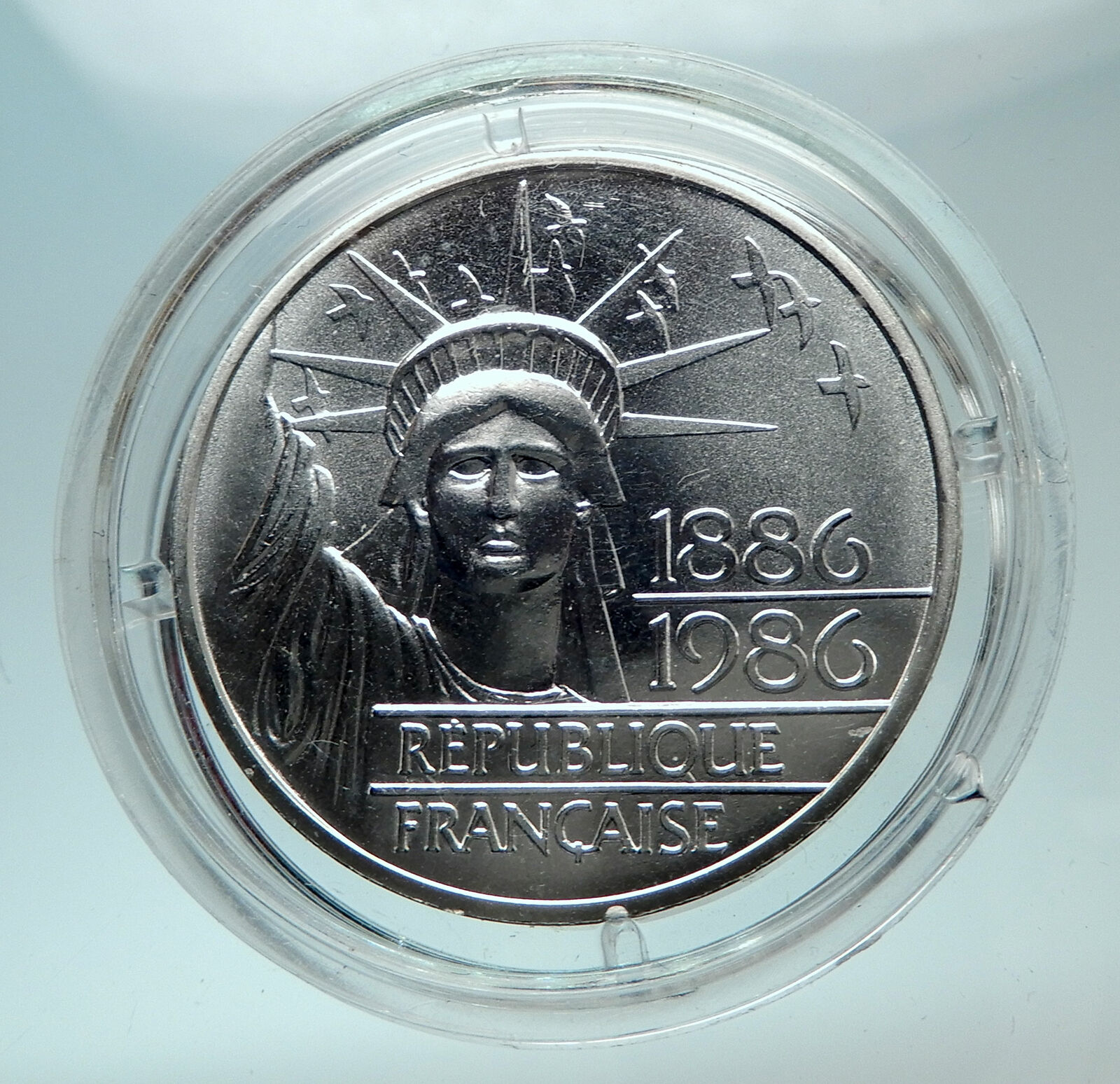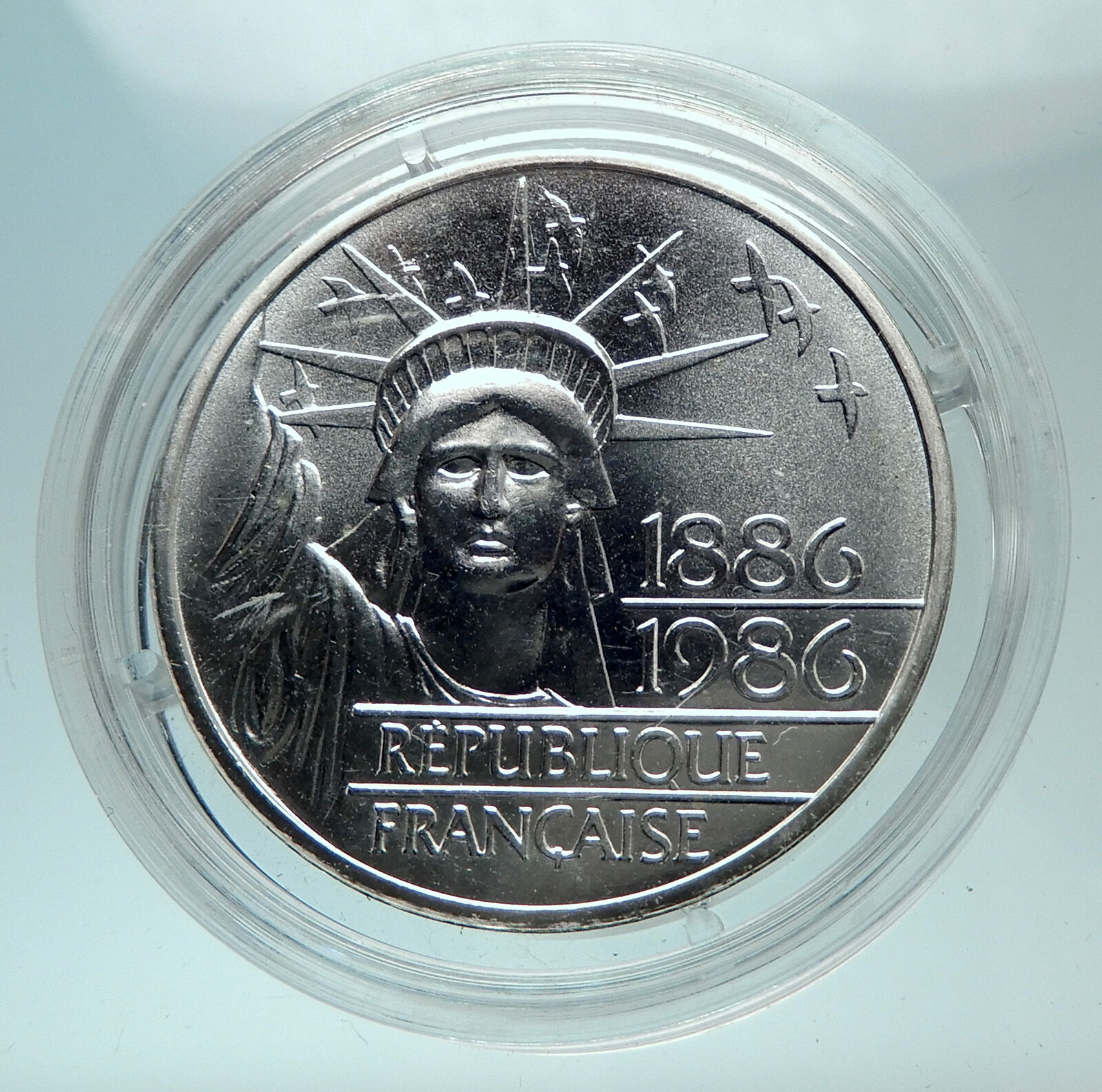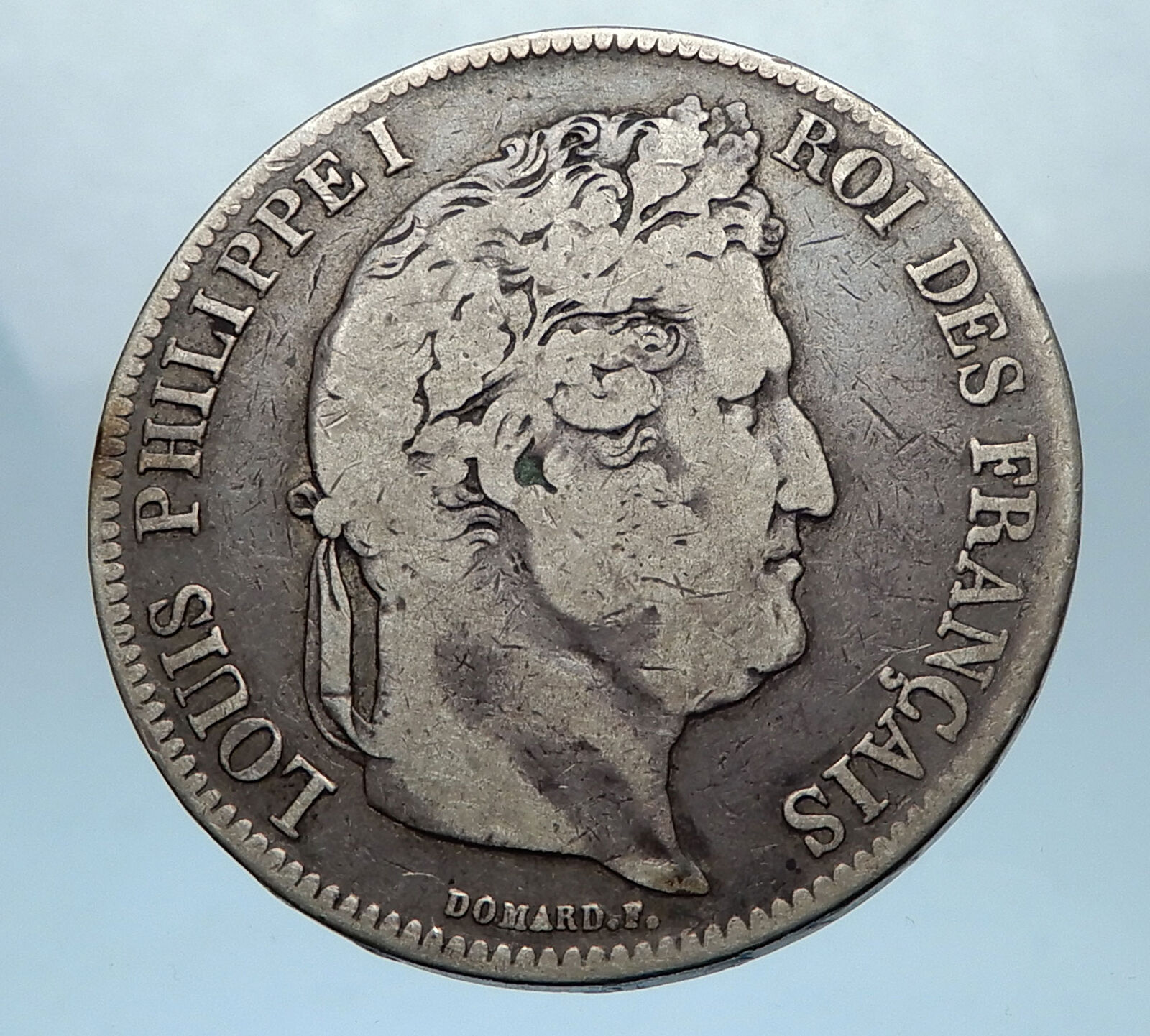|
France
1979 Silver 50 Francs 40mm (29.87 grams) 0.900 Silver (0.8681 oz. ASW)
Reference: F# 426, F# 427, Gad# 882, Schön# 237, KM# 941
Certification: NGC MS 64 2863159-015
LIBERTE EGALITE FRATERNITE. Liberty, holding the liberty cap on rod and Equality clasping hands with Hercules at center embracing them.
REPUBLIQUE FRANÇAISE 50 FRANCS, Wreath.
You are bidding on the exact item pictured, provided with a Certificate of Authenticity and Lifetime Guarantee of Authenticity.
Liberté, égalité, fraternité (pronounced: [libɛʁte eɡalite fʁatɛʁnite]), French for “liberty, equality , fraternity “, is the national motto of France and the Republic of Haiti , and is an example of a tripartite motto . Although it finds its origins in the French Revolution , it was then only one motto among others and was not institutionalized until the Third Republic at the end of the 19th century. Debates concerning the compatibility and order of the three terms began at the same time as the Revolution.

Symbolism of Hercules: The symbol of Hercules was first adopted by the Old Regime to represent the monarchy. Hercules was an ancient Greek hero who symbolized strength and power. The symbol was used to represent the sovereign authority of the King over France during the reign of the Bourbon monarchs . However, the monarchy was not the only ruling power in French history to use the symbol of Hercules to declare its power.
During the Revolution, the symbol of Hercules was revived to represent nascent revolutionary ideals. The first use of Hercules as a revolutionary symbol was during a festival celebrating the National Assembly’s victory over federalism on 10 August 1793. “Federalism” was a movement to weaken the central government. This Festival of Unity consisted of four stations around Paris which featured symbols representing major events of the Revolution which embodied revolutionary ideals of liberty, unity, and power.
The statue of Hercules, placed at the station commemorating the fall of Louis XVI , symbolized the power of the French people over their former oppressors. The statue’s foot was placed on the throat of the Hydra , which represented the tyranny of federalism which the new Republic had vanquished. In one hand, the statue grasped a club, a symbol of power, while in the other grasping the fasces which symbolized the unity of the French people. The image of Hercules assisted the new Republic in establishing its new Republican moral system. Hercules thus evolved from a symbol of the sovereignty of the monarch into a symbol of the new sovereign authority in France: the French people.
This transition was made easily for two reasons. First, because Hercules was a famous mythological figure, and had previously been used by the monarchy, he was easily recognized by educated French observers. It was not necessary for the revolutionary government to educate the French people on the background of the symbol. Additionally, Hercules recalled the classical age of the Greeks and the Romans, a period which the revolutionaries identified with republican and democratic ideals. These connotations made Hercules an easy choice to represent the powerful new sovereign people of France.
During the more radical phase of the Revolution from 1793 to 1794, the usage and depiction of Hercules changed. These changes to the symbol were due to revolutionary leaders believing the symbol was inciting violence among the common citizens. The triumphant battles of Hercules and the overcoming of enemies of the Republic became less prominent. In discussions over what symbol to use for the Seal of the Republic, the image of Hercules was considered but eventually ruled out in favor of Marianne .
Hercules was on the coin of the Republic. However, this Hercules was not the same image as that of the pre-Terror phases of the Revolution. The new image of Hercules was more domesticated. He appeared more paternal, older, and wiser, rather than the warrior-like images in the early stages of the French Revolution. Unlike his 24-foot statue in the Festival of the Supreme Being, he was now the same size as Liberty and Equality.
Also the language on the coin with Hercules was very different from the rhetoric of pre-revolutionary depictions. On the coins the words, “uniting Liberty and Equality” were used. This is opposed to the forceful language of early Revolutionary rhetoric and rhetoric of the Bourbon monarchy. By 1798, the Council of Ancients had discussed the “inevitable” change from the problematic image of Hercules, and Hercules was eventually phased out in favor of an even more docile image.
  France, officially the French Republic (French: République française), is a sovereign state comprising territory in western Europe and several overseas regions and territories . The European part of France, called Metropolitan France , extends from the Mediterranean Sea to the English Channel and the North Sea , and from the Rhine to the Atlantic Ocean . France spans 640,679 square kilometres (247,368 sq mi) and has a total population of 67 million. It is a unitary semi-presidential republic with the capital in Paris , the country’s largest city and main cultural and commercial centre. The Constitution of France establishes the state as secular and democratic, with its sovereignty derived from the people. France, officially the French Republic (French: République française), is a sovereign state comprising territory in western Europe and several overseas regions and territories . The European part of France, called Metropolitan France , extends from the Mediterranean Sea to the English Channel and the North Sea , and from the Rhine to the Atlantic Ocean . France spans 640,679 square kilometres (247,368 sq mi) and has a total population of 67 million. It is a unitary semi-presidential republic with the capital in Paris , the country’s largest city and main cultural and commercial centre. The Constitution of France establishes the state as secular and democratic, with its sovereignty derived from the people.
During the Iron Age , what is now Metropolitan France was inhabited by the Gauls , a Celtic people. The Gauls were conquered in 51 BC by the Roman Empire , which held Gaul until 486. The Gallo-Romans faced raids and migration from the Germanic Franks , who dominated the region for hundreds of years, eventually creating the medieval Kingdom of France . France emerged as a major European power in the Late Middle Ages , with its victory in the Hundred Years’ War (1337 to 1453) strengthening French state-building and paving the way for a future centralized absolute monarchy . During the Renaissance , France experienced a vast cultural development and established the beginning of a global colonial empire . The 16th century was dominated by religious civil wars between Catholics and Protestants (Huguenots).
France became Europe’s dominant cultural, political, and military power under Louis XIV . French philosophers played a key role in the Age of Enlightenment during the 18th century . In 1778, France became the first and the main ally of the new United States in the American Revolutionary War . In the late 18th century, the absolute monarchy was overthrown in the French Revolution . Among its legacies was the Declaration of the Rights of Man and of the Citizen , one of the earliest documents on human rights , which expresses the nation’s ideals to this day. France became one of modern history’s earliest republics until Napoleon took power and launched the First French Empire in 1804. Fighting against a complex set of coalitions during the Napoleonic Wars , he dominated European affairs for over a decade and had a long-lasting impact on Western culture. Following the collapse of the Empire, France endured a tumultuous succession of governments: the monarchy was restored , it was replaced in 1830 by a constitutional monarchy , then briefly by a Second Republic , and then by a Second Empire , until a more lasting French Third Republic was established in 1870. By the 1905 law , France adopted a strict form of secularism , called laïcité , which has become an important federative principle in the modern French society.
France reached its territorial height during the 19th and early 20th centuries, when it ultimately possessed the second-largest colonial empire in the world. In World War I , France was one of the main winners as part of the Triple Entente alliance fighting against the Central Powers . France was also one of the Allied Powers in World War II , but came under occupation by the Axis Powers in 1940. Following liberation in 1944, a Fourth Republic was established and later dissolved in the course of the Algerian War . The Fifth Republic , led by Charles de Gaulle , was formed in 1958 and remains to this day. Following World War II , most of the empire became decolonized .
Throughout its long history , France has been a leading global center of culture, making significant contributions to art , science , and philosophy . It hosts Europe’s third-largest number of cultural UNESCO World Heritage Sites (after Italy and Spain ) and receives around 83 million foreign tourists annually, the most of any country in the world. France remains a great power with significant cultural , economic , military , and political influence. It is a developed country with the world’s sixth-largest economy by nominal GDP and eight-largest by purchasing power parity . According to Credit Suisse, France is the fourth wealthiest nation in the world in terms of aggregate household wealth. It also possesses the world’s second-largest exclusive economic zone (EEZ), covering 11,035,000 square kilometres (4,261,000 sq mi).
French citizens enjoy a high standard of living , and the country performs well in international rankings of education , health care , life expectancy , civil liberties, and human development . France is a founding member of the United Nations , where it serves as one of the five permanent members of the UN Security Council . It is a member of the Group of 7 , North Atlantic Treaty Organization (NATO), Organisation for Economic Co-operation and Development (OECD), the World Trade Organization (WTO), and La Francophonie . France is a founding and leading member state of the European Union (EU).
|










 France, officially the French Republic (French:
France, officially the French Republic (French: 